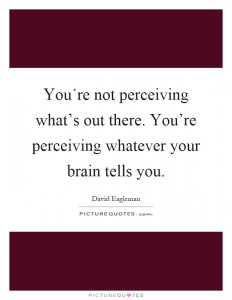
“You need to put more effort into your math,” directed the flustered fifth-grade teacher to the chatterbox student – who just happened to be me – and who was not chattering about math.
In response to the lack of impact her statement had on my attention, she added, “You might want to be a scientist when you grow up. Science and math go hand-in-hand!” And with this line, she pulled out the trusty, patented, and wholly ineffective response used by teachers across the country.
I often thought that me wanting to be a scientist was as likely as landing a date with Farrah Fawcett, but the latter was something for which I was willing to actually try. However, my teacher would ultimately be proven right. Science has indeed become a fascination for me, particularly neuroscience. The research emerging from this field is quickly changing our understanding of what it means to be human, how we relate to each other, and perhaps, most importantly, the remarkably effective mechanisms our brain employs to deceive itself.
We’ve begun to learn just how powerfully the mind can assert its view of the world as being correct, while aggressively muting the beliefs and opinions of others. Even more profound is our ability to be blind ourselves to evidence that is contrary to our beliefs, especially when we feel threatened. In short, we are starting to see just how effectively we create a version of reality, rather than perceive an elusive and purely subjective truth.
There is no doubt that math and science are variations of the same language, however, I believe it’s time to start better connecting science to the study of history. Specifically, the “science of us,” rather than only the “story of us.” For decades, we’ve asserted that we teach the narrative of history so that we can learn from it, and that our darkest moments don’t get repeated.
The only problem is, it hasn’t worked.
I believe that this failure is primarily due to our over-reliance on memorizing what happened, instead of developing an understanding of the human drivers of “why.” As history curriculums developed over the years, we didn’t have access to much of this “neuro-why.” But, that has changed.
This approach is also why we seem doomed to stubbornly not learn from history and allow the dreaded “it” to happen again. History is told as narrative, and our culture loves narratives of binary simplicity. Black hats and white horses. Villains who are just evil, and heroes who are just good.
Germans during WWII? Just evil people. Anyone born in Arkansas around 1840? Likely racists who were eventually on the “bad side” during the Civil War. The capitalists of the urban sweatshops? Bad people, too. Capitalists as job creators? Good. The French of the French and Indian War? Bad. The French of the Revolutionary War? Good.
This oversimplification also explains our discomfort with explaining America’s own dark moments. McCarthy? The Klan? Japanese Internment Camps? Blankets laced with diseased passed out to Native Americans? Bad. Bad. And, bad. Further, bad that happened in the past for some unexplained reason that is vaguely tied to communists, culture, or momentary lapses in judgment. However, they are considered anomalies that couldn’t possibly happen again.
Blips on the radar of immorality.
Understand that my attention is not born out of some sort of “apologist” attitude or subconscious disdain of the American way of life. To the contrary, it is the unique greatness of this country that makes these unusual behaviors so fascinating and worthy of study. It demonstrates that the best of humanity can turn ugly.
The question is why?
We shouldn’t uncomfortably avoid these episodes, we must carefully examine them through a scientific lens, with the latest understandings. The emerging science would assert that everyone involved in these dark episodes in our history had themselves fully and effectively deceived.
They were successfully rationalizing things that, in hindsight, seem impossible to rationalize. They believed they were justified in actions that would confound later generations.
Why doesn’t our binary and “at-a-glance” approach not work for preventing the repeat of horrific acts by those who know the mistakes of the past? Because, we avoid the human element. We imply that the German people were inherently bad, rather than normal people who potentially supported bad acts, or were at least complicit. What distinctively human elements would allow otherwise average people to engage, support, or ignore the horrors of concentration camps?
People that, in many ways, were not that different from you and me, with one trait I know we share: The ability for rationalization and self-deception.
Not only do we understand that it happens, we are beginning to explain how we have evolved to predictably demonstrate these traits. We can explain inside group – outside groups, dehumanization, and group-think. But we don’t. And, we certainly don’t relate this new understanding to our civilization’s past.
History should not just tell the story, it should teach us to recognize the mechanisms, motivators, and indications when we are about to create another moment that our grandchildren will struggle to understand. History should represent a deep and scientific study of us. One that carefully identifies and scrutinizes what drives both our glory and our darkness.









Comments 1
I don’t know, Mike, isn’t Howard Zinn’s People’s History of The US pretty much required reading for high school students? I know my kid had to go through it. And that book certainly isn’t a sanitized, or very balanced, from what I’ve heard, version of our history. I’d lean more toward promoting intellectual history – the history of ideas – as being more effective in facing our light and dark sides and the concepts that fertilize them.